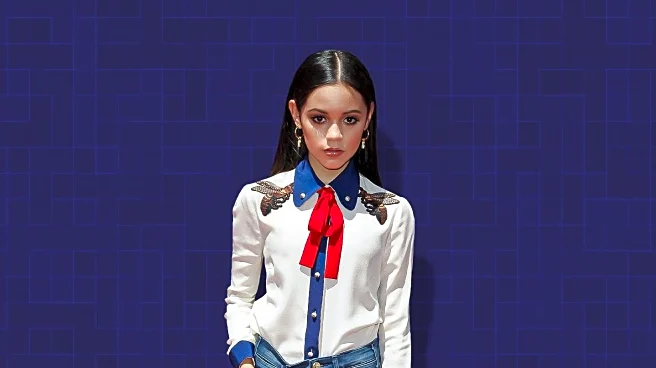What's Happening?
Jenna Ortega, known for her role in the popular series 'Wednesday', has brought back the going-out vest trend from the early 2000s. At a recent 'Wednesday For Your Consideration' event, Ortega was seen
wearing a pinstriped Ann Demeulemeester waistcoat paired with matching wide-legged trousers. Styled by Enrique Melendez, her outfit is reminiscent of the fashion choices made by celebrities like Fergie and Avril Lavigne in 2007, who often paired vests with T-shirts and tank tops. Ortega's choice to wear this ensemble highlights her influence in the fashion world and her ability to resurrect past trends with a modern twist.
Why It's Important?
The revival of the going-out vest by Jenna Ortega signifies a broader trend in the fashion industry where past styles are being reimagined for contemporary audiences. This move not only showcases Ortega's fashion-forward thinking but also reflects the cyclical nature of fashion trends. As a prominent figure in entertainment, Ortega's fashion choices can influence consumer behavior and inspire designers to revisit and update older styles. This trend could lead to increased interest in vintage and retro fashion, impacting retail strategies and consumer preferences in the U.S. fashion market.
What's Next?
As Jenna Ortega continues to make waves in the fashion industry, it is likely that more celebrities and fashion influencers will follow suit, embracing the going-out vest and similar retro styles. Designers may start incorporating these elements into their upcoming collections, potentially leading to a resurgence of early 2000s fashion trends. Retailers might also capitalize on this trend by offering modern interpretations of vintage styles, appealing to consumers who are nostalgic for past fashion eras.
Beyond the Headlines
The revival of the going-out vest by Jenna Ortega also highlights the cultural impact of fashion icons in shaping societal norms and preferences. This trend underscores the role of celebrities in bridging the gap between past and present fashion, encouraging a diverse and inclusive approach to style. It may also prompt discussions on sustainability in fashion, as consumers and designers look to repurpose and reinvent existing garments rather than producing new ones.











